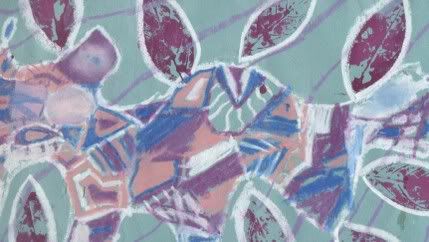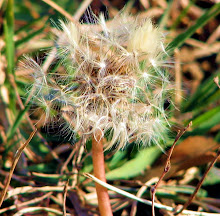(About The Ten Year Nap)

At twenty, I was a dreamy girl halfway through college until a brisk full-moon night laced with snow and stars revealed my firstborn's shocking existence. I fell into motherhood clumsily...ineptly. I hadn't necessarily wanted to be a mother--was never a girl who had her dream wedding planned since seventh grade with the ideal set of matching babies to go along with it. I swooned over stories of poets locked in Parisian garrets or writers with heavy notebooks thumbing rides across the country and back again. I hungered for travel and pined for a vagabond life that wasn't meant for me--right up until the baby was born, when I couldn't see any further than the glow cast by her nightlight as we swayed in the rocking chair--a whole continent unto ourselves. I wasn't a natural at it...still am not in a conventional sense. But, shhh...don't tell my three children that, because for eleven years we have stumbled along together--making it up as we go along...winging it, carrying on in a greater adventure than any I'd read about.
Still, it was unusual...juggling babysitters and packing a diaper bag with sippy cups then dashing across campus, looking to the world like just another co-ed, to attend seminars on Women in Shakespeare or Linguistics: Semiotics, praying that the mandatory study session wouldn't interfere with the baby's bedtime. I ventured into student-teaching (full-time work with zero pay), putting her in daycare without a second thought--not realizing until I stood up in front of an angst and hormone-ridden classroom that I craved my daughter like a drug and I couldn't bring myself to leave her for work "for real". The semester ended, and so did my brief foray into full-time teaching...I quickly got used to being the youngest mother on the playground and to scraping by on just one income. I never fit in with the "mommies" who had handi-wipes in their bags to share or an extra pack of goldfish crackers when I'd remembered to bring along a book of Neruda's poems in my backpack, but not the baby's snack. Somehow my age insulated me from the hotly contested "mommy wars" and related issues--I was already an odd-ball mother, and we already didn't have any money to speak of.
The characters in Meg Wolitzer's novel, The Ten Year Nap, were already established in their careers when they made the often-fraught decision to leave the workforce behind to raise their children. They contend with issues of finances, shifting roles in their marriages, and a deep sense of inertia now that their children's early years have passed. Unlike most of the material written about the relationship between stay-at-home and working-mothers, this is a work of fiction--so the potential to get deeply within the subject exists without the need for objective/academic distance. However, my feelings about this novel are definitely mixed. Wolitzer's writing is undeniably poetic and lyrical in places, however, the overall trajectory of the story was a bit slow for me. I appreciated how the author traveled in and out of the perspectives of the women, providing depth and insight into the broader spectrum of emotions brought up by being a full-time mother. But, the one "working-mother" character, Penny, isn't given her own point-of-view and is instead viewed at a distance by the full-time mothers who alternate feelings of envy and sympathy for her situation. To cover the broader spectrum of maternal uncertainty, and to illustrate that *both* working and at-home mothers experience very similar concerns and doubts, it would have made sense to give Penny a voice. Many people argue that the issues between mothers who work out of the home and those who don't have been a bit over-played at this point. Women who want to work and/or need to work should--and those who don't/can't shouldn't feel forced to. Right? However, in The Ten Year Nap, Wolitzer gives readers more to think about concerning this ambiguous and often-debated topic. It is well-worth a read.
As for me, I will be joining the full-time workforce this fall with the onset of a high-school teaching gig. I have cobbled together a part-time college adjunct and freelance writing and editing career in the eleven years I've been a mother...so, in many ways, I still hover just beyond the edges of this discussion, not fully fitting into either mothering "camp". Still, my heaviest work days are ahead of me...my eldest will enter junior high in September and come home to an empty house afterwards. My third-grade son and kindergarten "baby" will be in a classroom until after I am done work for the day. Unlike the mothers in this novel who grapple with whether or not they want to go back to work, I am leaping in without a second thought. Life has shifted profoundly in the past six months and, for me, having this teaching career launched once and for all is a part of the deep process of "waking up" I'm experiencing already. I think women's experiences are far more complex and dynamic than to distill mothering down into two roles: SAHM or Working Mother and then declare one superior to the other.
And anyway, there will always be the gypsy-mamas like me who never quite fit into the carefully constructed ideals...who are surprised by motherhood, shocked by the ferocity of their love for their children...mothers who keep active in the workplace but also spend long afternoons painting watercolors with a toddler...mothers who are wistful on cold starry nights and who may not be able to run a company or to remember to bring the color-coded-tupperware-lidded-baked-from-scratch cupcakes to the classroom party either. But, my backpack is still full of poetry...and if you ask me nicely...I just may share the ephemeral wonder of words with you.

***I'm also willing to share my copy of The Ten Year Nap with one random commenter below! (Leave your thoughts about this issue or about "waking up" in general & I'll let you know next Thursday who that is.)***
Edited to add: we put the names into a baseball hat and my youngest picked JANUARY's name out! I hope you enjoy the book...
Labels: MotherTalk, The Ten Year Nap











